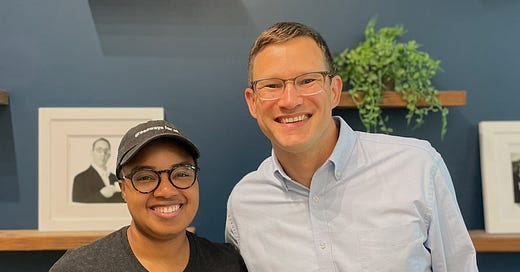Friday Bonus: Name Twin, City Kin: A conversation with Angela Hollowell
Notes on Durham, creativity, and our shared last name
I want to introduce you to someone. She lives in Durham, she’s a creative writer, and get this: her name is Angela Hollowell.
Wild, right?
Angela is incredible. She writes two newsletters: Please Hustle Responsibly, a gathering of underrepresented creative entrepreneurs, and Melanin MVP, a celebration of women athletes of color. Both newsletters have video podcasts, too: Honey & Hustle and Melanin MVP. She’s also a filmmaker who crowdfunded support for Trail Therapy, a short documentary about therapist and runner Sharon Mosley. And she’s an on-field photographer for my beloved North Carolina Courage!
Angela and I found each other on Substack a few months ago, realized how much we had in common, and decided this lovely coincidence called for a writing collaboration. After meeting recently at a local staple, Foster Street Coffee, we posed a few questions about Durham, creativity, and our shared last name.
And we’re sharing our answers with you.
Enjoy!
What does being a Hollowell mean to you?
Angela: At times, it means having my last name misspelled or mispronounced as "Holloway." Other times, it means embracing the uniqueness and rarity of my last name. My dad's family is from Phenix City, Alabama (near the Alabama/Georgia border) and I've lived the majority of my life in Phenix City. I like to believe that my hometown has had a significant influence on how I see myself, life, and opportunity. Since "Hollywood" is another common mispronunciation, I like to think that filmmaking is in my blood.
Adam: All of the associations I have with my last name stem from my paternal grandparents, Al and Nita Hollowell. They were deeply passionate about baseball history, home cooked meals, flea market finds, and, lucky for me, their grandchildren. Being a Hollowell means carrying forward their qualities of love, service, and generosity. Of course, as you said, it’s also endlessly misspelled and mispronounced. (The Spice Girls made things especially bad in the 1990s. Ginger Spice is Gerri Halliwell.)
What does being from Durham mean to you?
Angela: Being a Durham transplant, but fully embracing the title of a Durhamite means going all in on diversity, inclusion, community, music, supporting small businesses, and being a raving Durham Bulls fan. When I first visited Durham in 2019, about a month before I moved to the city, it immediately felt like home. I love the pace of life here. I love the legacy of Black Wall Street that so many are still fighting to maintain, elevate, and uphold. I love that Durham fights for the rights of everyone, no matter where they're from. I think sometimes we take for granted that our words and actions mean something, and being from Durham, I understand that I have to be accountable for both on a daily basis.
Adam: I’d echo all of these things. My office is in the historic NC Mutual Building, an icon of Durham’s Black Wall Street and also, previously, where the Duke family lived. Every block of the city contains both the triumphs and tragedies of its history. It’s also funny that you say being from Durham means that our words and actions mean something. I have an easier time identifying with North Carolina as a state than Durham as a city, mostly because I’m an ethicist and can’t hide my enthusiasm for the state motto: esse quam videri / “to be rather than to seem.” But you’re right that integrity really matters in Durham, specifically, too. Of course, I love the Durham Bulls, too!
What does being a creative mean to you?
Angela: Being a creative means using my imagination to invent what I'd like to see in the world. Maybe even what I'd like to see in myself. There is a part of my creativity that feels like an intrinsic need to be of service to my community and my past self. But I'd be lying if I weren't also honest about the part of me that is inherently drawn to the beautiful, the weird, the aesthetic, the quirky, the depth, the witty, the whimsy, and the vulnerability that is required for art to exist. The concept of creativity scares me, because I am afraid I cannot create something as incredible as the things I've seen. It also excites me, because by my very presence on this earth, I have the opportunity to try. So my creativity is just me trying.
Adam: That is beautiful—I like your answers so much! I only started to think of myself as a creative person over the past ten years or so. When I was younger I knew I couldn’t paint, play an instrument, or sing, so I thought I just didn’t have the artistic gene. Then one day I was editing a piece I had written and realized I was trying to shape the words into something beautiful. The goals, styles, and formats of my writing have exploded in the years since, which has been fun. And scary. But mostly fun.

What has writing (and publicly sharing that writing) meant for you, personally and creatively?
Adam: You should have the last word on this one. As for me, writing has helped me understand myself and my place in the world around me. I write to figure out what I think about something or how to move forward when I am not sure which way to go. Publicly sharing that writing has meant growing more comfortable with imperfection, failure, and rejection. The lessons are hard, but they make me a better person. Finally, co-writing has been a way of developing friendships with people that I treasure. Friends like John, Jamie, Keisha, Jonas, and Solomon. (One day we’ll manage to get something published, Solomon!) And, of course, writing brought me here, to this collaboration with you. What a gift!
Angela: If I had to guess, about 75% of my writing is not seen or read by anyone but me. The other 25% is what ends up on the internet in some way. That may sound like a huge disparity and withholding of ideas and words. But the reality for me is that the writing done in secret allows for the writing that is shared in public. Writing offers you critical distance from your own thoughts. When I don't know what to do or who to turn to, I turn to my magic paper tablet and write directly to God. I started the habit of writing morning pages last year. Writing morning pages takes time. It requires effort. Like with a movement practice, I notice when I don't do it, which is exactly how I know it's good for me. The first page typically feels like a brain dump, just getting out whatever is on my mind. The second page gets a little more structured, and I start brainstorming ideas or items that should be added to my to-do list. The third page often feels like a prayer, where I'm speaking directly to God about my hopes and dreams. I'm never in a drought for ideas anymore, there's never a question of what I should be writing or publishing next. There is only the understanding that I should be writing, and that this act is synonymous with my being and daily routine.








